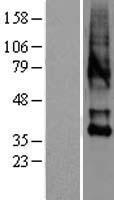order histories, retained contact details for faster checkout, review submissions, and special promotions.
Forgot password?
order histories, retained contact details for faster checkout, review submissions, and special promotions.
Location
Corporate Headquarters
Vector Laboratories, Inc.
6737 Mowry Ave
Newark, CA 94560
United States
Telephone Numbers
Customer Service: (800) 227-6666 / (650) 697-3600
Contact Us
Additional Contact Details
order histories, retained contact details for faster checkout, review submissions, and special promotions.
Forgot password?
order histories, retained contact details for faster checkout, review submissions, and special promotions.
OXTR / Oxytocin Receptor
oxytocin receptor
The oxytocin receptor belongs to the vasopressin/oxytocin family of GPCRs because it binds similar cyclic nonapeptide hormones. The oxytocin receptor functions primarily during labor and lactation. There is a dramatic increase in the number of oxytocin receptors just before the onset of labor causing the uterine muscles to become exceedingly sensitive to oxytocin. The activated oxytocin receptor causes an inward membrane current that results in smooth muscle contraction during labor and milk ejection during lactation. This receptor also plays a role in natriuresis, kaliuresis and may have an antistress effect.
| Gene Name: | oxytocin receptor |
| Family/Subfamily: | GPCR , Vasopressin/oxytocin |
| Synonyms: | OXTR, Oxytocin receptor, Oxt-r, OT-R |
| Target Sequences: | NM_000916 NP_000907.2 P30559 |
Publications (2)





If you do not find the reagent or information you require, please contact Customer.Support@LSBio.com to inquire about additional products in development.









